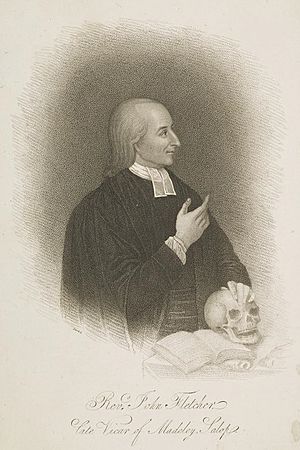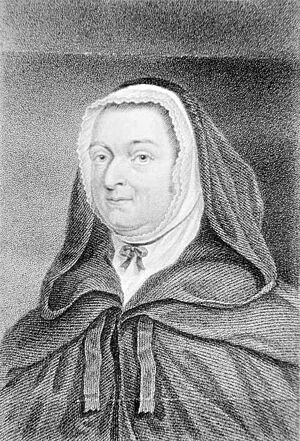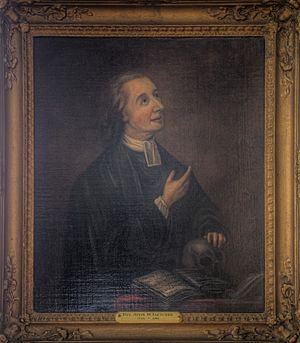John William Fletcher facts for kids
Quick facts for kids
John William Fletcher
|
|
|---|---|
 |
|
| Born |
Jean Guillaume de la Fléchère
12 September 1729 |
| Died | 14 August 1785 (aged 55) |
| Resting place | St. Michael's Churchyard, Madeley, Shropshire, England |
| Education | University of Geneva |
| Occupation | Priest of the Church of England, and theologian |
| Years active | 1757–1785 |
| Employer | Church of England |
| Known for | Vicar of Madeley, Shropshire; Theologian of the Methodist movement |
| Title | Vicar of Madeley, Shropshire |
| Predecessor | Rev. Rowland Chambre |
| Successor | Rev. Henry Burton (Vicar); Rev. Melville Horne (Curate); Rev. Samuel Walter (Curate) |
| Opponent(s) |
|
| Spouse(s) | |
John William Fletcher (born Jean Guillaume de la Fléchère; 12 September 1729 – 14 August 1785) was a religious leader from Switzerland who became important in England. He was a Methodist leader and a priest in the Church of England. Fletcher worked closely with John Wesley, who started the Methodist movement. He helped explain Wesley's ideas and became one of the first great thinkers in Methodism. People in Britain admired him for his strong faith and kindness.
Contents
His Early Life
Jean Guillaume de la Fléchère was born in 1729 in Nyon, Switzerland. He was the youngest of eight children. His father, Jacques de la Fléchère, was an army officer.
John Fletcher studied in Geneva. He wanted to join the army instead of becoming a priest. He even went to Lisbon to enlist. But an accident stopped him from sailing with his regiment to Brazil. After visiting Flanders, he moved to England in 1750. He had always wanted to travel to England and had learned English before he arrived.
In 1751, he became a tutor for the sons of a rich family, Thomas and Susanna Hill. While living in London with the Hill family, Fletcher learned about the Methodists. He met John Wesley and Charles Wesley, who were brothers and leaders of the movement. He also met his future wife, Mary Bosanquet.
Becoming a Minister
In 1757, John Fletcher became a deacon and then a priest in the Church of England. He preached his first sermon in Atcham. Soon after, he became a curate in the parish of Madeley, in Shropshire.
Besides his duties in Madeley, he sometimes preached with John Wesley in London. Fletcher became known as a strong supporter of the Evangelical Revival. He felt God was calling him to work in a local church. He turned down a rich church position and chose the smaller, industrial parish of Madeley. He cared deeply for the people there.
For 25 years (1760–1785), he worked in Madeley with great dedication. His wife described his work as "unexampled labours." Fletcher was very committed to the Methodist goal of spiritual renewal. He supported the Wesleys as a theologian, but he always remained loyal to the Church of England. John Wesley had even chosen Fletcher to lead the Methodist movement after Wesley's death. However, Fletcher passed away before Wesley.
His Marriage
In 1781, Fletcher returned from Europe where he had been recovering from a serious breathing problem. When he came back, he started writing to Mary Bosanquet. He had met her almost 30 years earlier. Mary Bosanquet was one of the first women preachers allowed by John Wesley.
Fletcher and Bosanquet had first met in the 1770s. At that time, Fletcher thought about asking her to marry him, but he believed she was too wealthy. He decided to dedicate himself fully to God instead. In June 1781, they wrote letters to each other. Fletcher admitted he had admired her since they first met. They got married on 12 November 1781, in Yorkshire.
They moved back to Madeley on 2 January 1782. Their marriage was short, as Fletcher died less than four years later, on 14 August 1785. After his death, Mary Fletcher was allowed to stay in the vicarage. She continued her husband's work in the parish for another 30 years. She died in Madeley in December 1815 and was buried in the same grave as her husband.
What He Believed (Theology)
John Fletcher was a deep thinker about religious ideas. He believed in what is called Arminianism. This means he thought that God offers salvation to everyone, and people have the free will to choose to accept it. He disagreed with some ideas of Calvinism, which suggested that God chooses only certain people for salvation.
Fletcher tried to discuss his beliefs with respect, even when people disagreed with him. He was known for his strong faith and kindness. John Wesley said Fletcher was the holiest person he had ever met. Many people, including the writer Robert Southey, praised Fletcher's deep faith and loving nature. Even Voltaire, a famous French writer, reportedly mentioned Fletcher as a very good person.
Most of Fletcher's important writings were published between 1770 and 1778. During this time, there was a lot of debate between Wesley's Methodists and some Calvinists in Britain. Fletcher wrote his famous book, Five Checks to Antinomianism, to support John Wesley. This book was the first major Methodist theological work written by someone other than John or Charles Wesley.
Fletcher also wrote a lot about "entire sanctification." This idea means that a Christian's heart can be made perfect in love through God's grace. This teaching has been very important for the Holiness movement and Pentecostalism.
Fletcher helped organize Methodist beliefs into a clear system. He explained how God's power and human freedom work together. He saw God's power not just as ultimate strength, but as amazing love. He wanted to show that people have freedom to choose, but this freedom is always connected to God's grace.
How He Wrote
Fletcher's writings were serious, but they also showed his cleverness and sometimes humor. He often wrote his arguments as letters or as imaginary conversations. He also wrote sermons and poems. His book Portrait of St. Paul was written in French and published after he died. It was a guide for clergy.
He usually wrote about God's good qualities, like love, rather than just power or anger. His main ideas were:
- People need God's gift of salvation, which cannot be earned but must be received.
- The Christian faith is personal and involves ethical choices, showing both human ability and responsibility.
Fletcher summed up his own beliefs by saying that people have the freedom to choose life because of God's grace. He believed that God's grace helps people to choose what is right.
His writings are still used by Methodists and are especially popular among those in the Holiness movement.
His Books
Here are some of John Fletcher's well-known books:
- Five Checks to Antinomianism
- Scripture Scales
- Portrait of St Paul (originally in French)
- La Grace et la Nature (a poem)
 | Janet Taylor Pickett |
 | Synthia Saint James |
 | Howardena Pindell |
 | Faith Ringgold |



